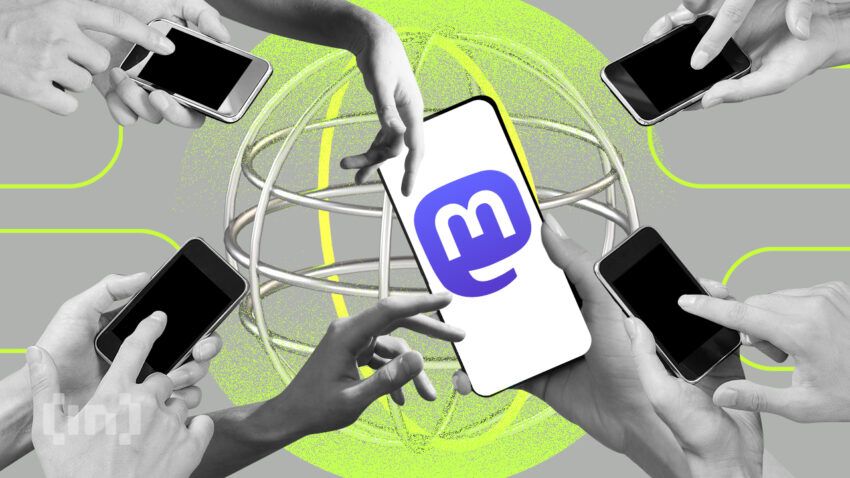The fight between the elephant and the blue bird intensifies. Don’t get too excited as it’s not an actual fight but a game of numbers between Mastodon (elephant as the mascot) — the new social platform on the block, and Twitter (blue bird as the mascot) — the tried and tested, Musk-owned entity. But aren’t we all happy with Twitter with Elon Musk promising free speech, fewer bots, and new features? It seems many of us aren’t, and that’s why we are here, discussing Mastodon, the Twitter alternative, at length.
We all have been yearning for decentralized social media for quite some time now. Zero dependencies on a centralized corporation, zero chances of getting banned by a central entity, and zero cases where the entire platform gets sold and reacquired! Mastodon aims to solve all that by showing up as a platform to help people, not the organization’s shareholders. Yet, it is new, and Mastodon, the Twitter alternative, has a long way to go before becoming mainstream.
Want to discuss new decentralized projects? Join BeInCrypto Trading Community on Telegram: with like-minded people: discuss, read all the hottest news on Web3 projects, ask and get answers!
Today, we do our bit by explaining Mastodon social media in detail, helping you make sense of the features, similarities, and differences with Twitter and if the Mastodon vs. Twitter narrative is even worth the time.
In this guide:
- Unpacking Mastodon: what is it, and why was it needed?
- Features of Mastodon, the Twitter alternative
- How to create an account on Mastodon, the Twitter alternative
- Mastodon, a better Twitter alternative?
- Mastodon vs. Twitter: everything important
- Are there any similarities?
- Why are people leaving Twitter for Mastodon?
- Decentralization is a “Mast” have
- Frequently asked questions
Unpacking Mastodon: what is it, and why was it needed?
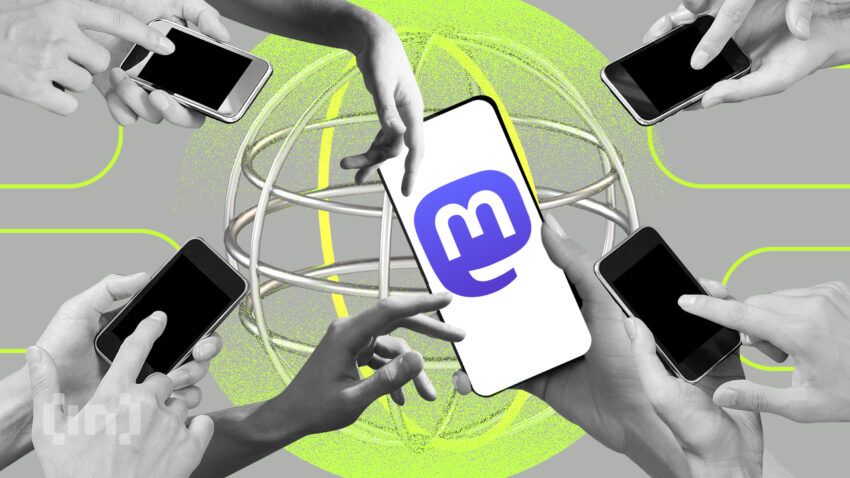
Let’s start with the definition: Mastodon came to exist in 2016 as the brainchild of Eugen Rochko — a German developer. It takes pride in calling itself a “decentralized” social media network where the focus is on the quality of conversations, free online existence (no $8 dependency), and a working structure that is free of central control.
But that’s not the fun part. The Mastodon social media network comprises multiple “individual” networks. These networks are called servers or “Instances” in the Mastodon lingo. And that’s what decentralization means in regard to Mastodon social media.
Due to the segregated structure, Mastodon is also a distributed social media network.
Mastodon’s history, growth, and reasons to exist
Rockho, in a year-old blog, mentioned that he created Mastodon to generate personal income. However, with this decentralized social network growing in leaps and bounds, he is now a fixed-wage employee as the organization needed more designers, developers, and other helping hands.
Rockho registered Mastodon as a non-profit organization in June 2021. A year and a few months later, Mastodon, the Twitter alternative, has reached a 1 million user base. The growth was flat until October 2022 but surged immediately when Elon Musk completed the Twitter acquisition on 27 Oct. Mastodon’s user base has been on an upward trajectory since, seeing almost 60 to 80 new users every hour.
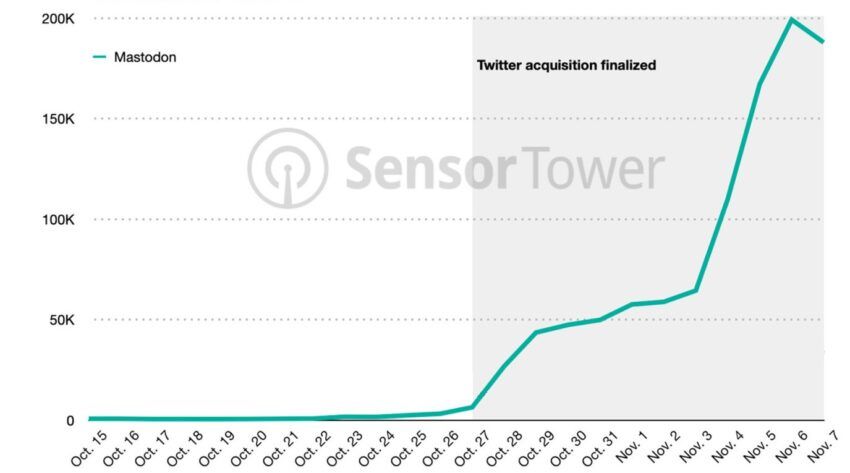
What propelled Mastodon’s popularity is Twitter’s change in ownership, Musk’s debated way of handling employees, and the paid verification tick. And as a decentralized social network, Mastodon now aims to host disgruntled users.
People weren’t happy:
Decentralization, as in blockchain???
Well, not exactly. Blockchain-specific decentralization means on-chain activities that everyone can see and trace. In the case of Mastodon, decentralization concerns the division of a big network into smaller networks — each being a Mastodon instance.
This is where we need to learn about another term in addition to decentralization: open-source. In the case of Mastodon, any user can set up their community by using open-source code. The rules and regulations vary with the type of community. If you are a Mastodon user in a particular community and do not agree with the rules, you can download the code and create your own community, server, or Mastodon instance.
Plus, it’s interoperable. This term means that Mastodon communities can interact with each other, provided the community hasn’t set up guardrails. All these inclusions aim at putting the power of social networking back into the hands of the user base.
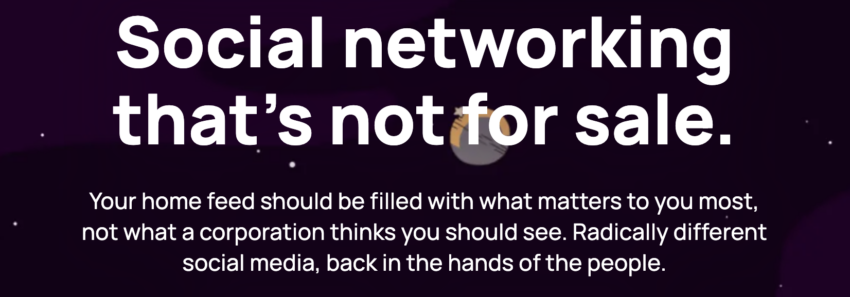
Wait, that’s exactly what the Mastodon tagline tells.
Also, this form of decentralized social network is termed federated. You can compare the vision to that of emails. Regardless of what your email client is — Hotmail, Yahoo, or Gmail — you can send and receive emails specific to an email client different from yours.
The traits that make Mastodon, the Twitter alternative, a reasonable option are decentralization, open-source code availability, and interoperability.
Mastodon app: the working
Mastodon, the Twitter alternative, works by coming across as a free-for-all social media network that prioritizes the user base over its growth. As a federated network, users are in control over the content they want to see and engage with.
Just to reiterate, no one company runs Mastodon, as even you or your friend can set up local servers — Mastodon instances, all while staying connected with users from different local servers. If one server goes down, there is no impact on other communities.
However, initially, while setting up, choosing the right server might look a bit difficult, but on Mastodon, you can always move the account in time. We will show you how to set up an account later in this discussion. Plus, Mastodon, the Twitter alternative, is free of advertisements — promising a more wholesome user experience.
Features of Mastodon, the Twitter alternative
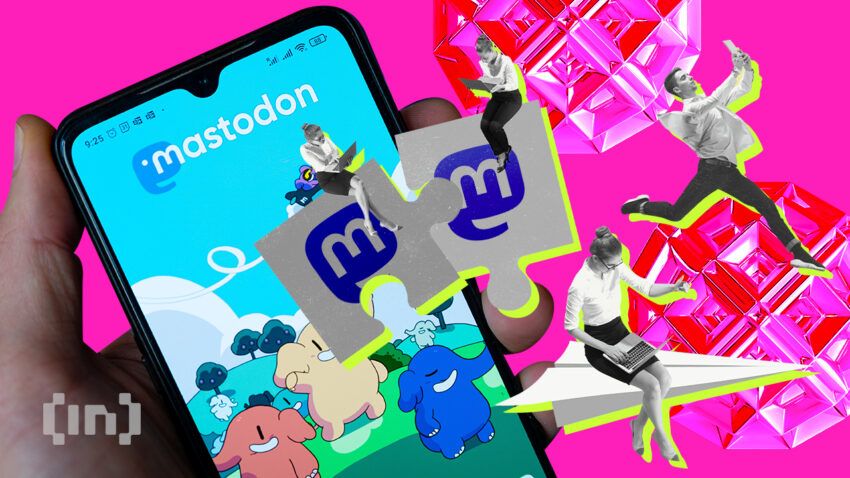
Now we come to the good part, the features which might make Mastodon, the Twitter alternative, stand out over time. The moment you look at Mastodon, you might start comparing it with Twitter — owing to the similar-looking interface. However, the Twitter alternative comes with several exclusive features:
Product atop a protocol
In a tweet from 28 Oct. 2022, Mastodon clearly mentions that it is a protocol-based product and not a centralized entity.
This means any other application having the same protocol will allow users to build a sense of continuity between Mastodon and the other app. The availability of a unified protocol makes Mastodon a part of the Fediverse — which comprises apps like PeerTube, PIXELFED, Misskey, and more.
Instances
We did talk about the different communities that allow you to create your Mastodon account with (out) guidelines. These communities or servers are termed instances. This means any user cannot barge into any other community and start shitposting. You need to choose the network you want to be a part of and adhere to the guidelines in play.
Boosts, favorites, and toots
Twitter users coming to Mastodon wouldn’t have to miss out on platform-specific features like Tweets, Likes, and Retweets. Mastodon provides all of that but with a basic change in name. Tweets become Toots, Likes become Favorites, and Retweets become Boosts.
Character limit
Mastodon lets you post toots. However, you can go as high as 500 characters instead of Twitter’s 280. And even though Elon Musk announced a few days back that long-form content might soon make it to Twitter, Mastodon has the edge courtesy of the short-form character boost.
Content moderation
Twitter has a platform-wide content moderation system. In the case of Mastodon, content moderation guidelines are also decentralized — meaning that every server or Mastodon instance can set rules and regulations for the members to follow.
Things might change, soon:
Open-source software
The developers behind Mastodon do not have any copyright to the product. Anyone can download the code, modify it, and install that version of Mastodon on their device. However, if you are using or making any sort of changes to the original code, you should acknowledge the original source.
If you are really interested in trying out the open-source software code, you can get hold of the same as this Git repository. As it features the AGPLv3 license, you can use the mastodon code block even for commercial purposes.
Different timelines
Mastodon offers a circle/timeline-specific content picks, depending on the people you follow, current server users, and the people your server users follow. The timelines are segregated as Home, Local, and Federated. This functionality allows the Mastodon user base to enjoy the content they best resonate with.
ActivityPub protocol
Mastodon’s feature reveals a very interesting thing about this decentralized social network. It is not a single website, but a chunk of sites meant to enrich global communication. It’s a part of the Fediverse where any user from Mastodon can use the Mastodon account to follow other accounts on other Fediverse apps. The only prerequisite is that the app should sit on top of the ActivityPub protocol.
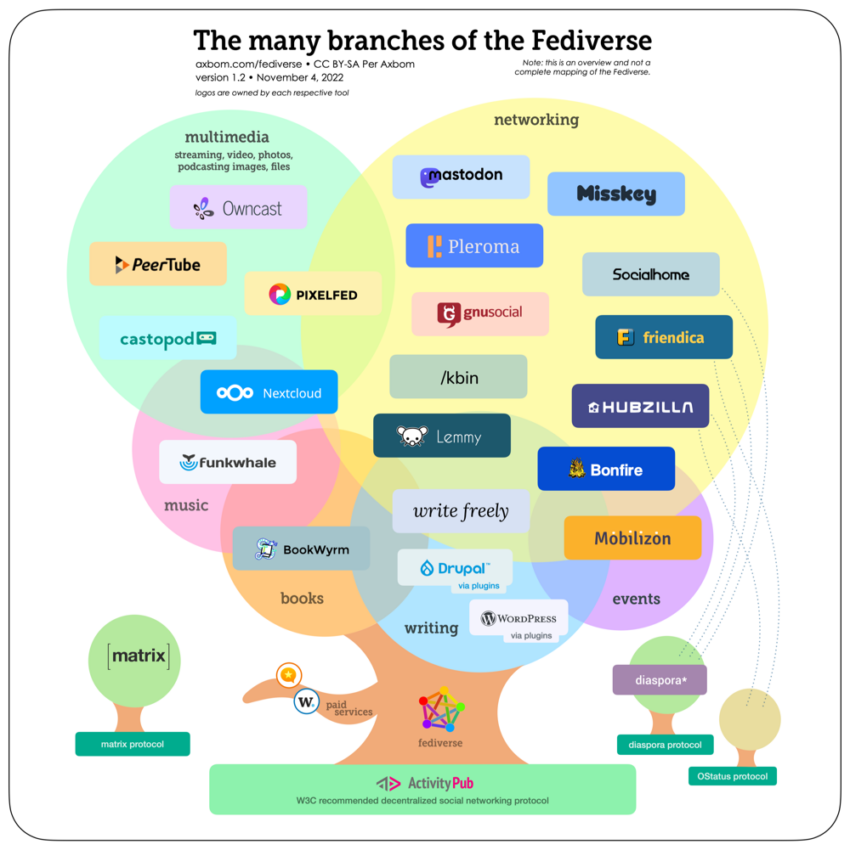
The potential of this approach is immense. Imagine a person with a social network account can now follow someone on a video streaming platform without having to create a new account. This is what interoperability means in the truest sense — especially with us moving closer to extensive Web 3.0 adoption, where control will be with the creators and users and not centralized organizations.
How to create an account on Mastodon, the Twitter alternative
Here is a step-by-step guide to setting up your first Mastodon, the Twitter alternative account:
Part 1: getting started
- Head over to joinmastodon.org. You can then consider getting the app or creating an account directly from the browser.
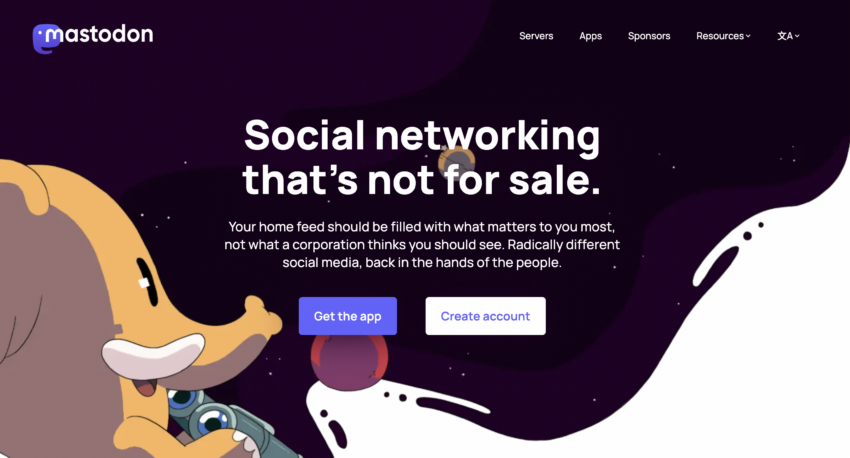
- The page with multiple servers (instances) will show up. You can pick any server of your choice and create an account. You will see the region-wise filter for selecting an account on the right-hand side. If you scroll up, you will see an option to select accounts based on the topics.
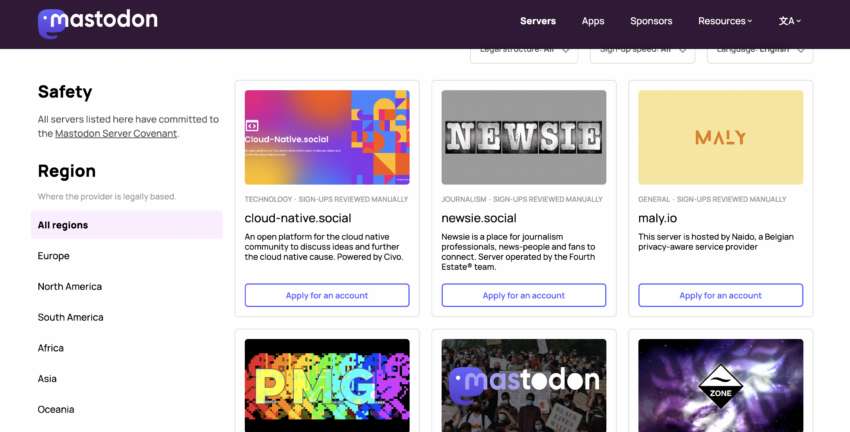
- Let us start by applying for an account on the mstdn.social — a general server and an instance.
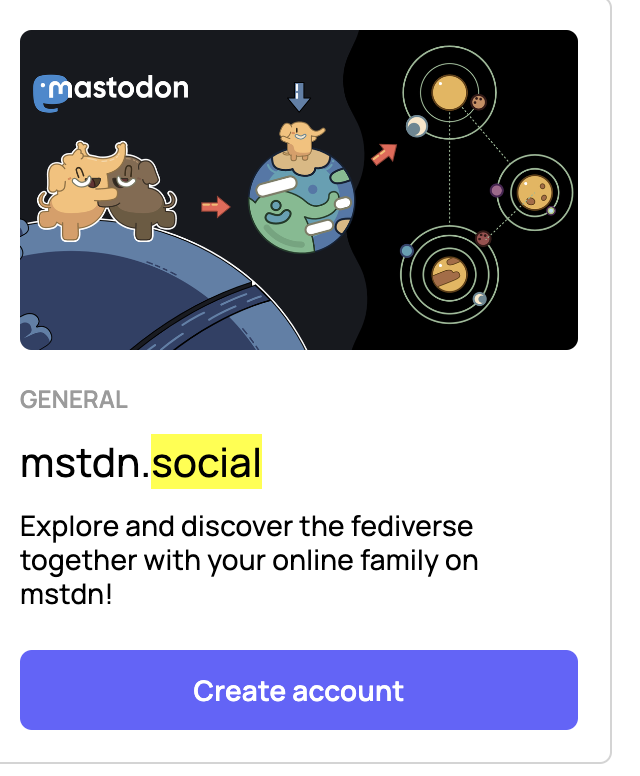
- You can view the server stats and even explore the earlier posts on this server. If you see what you like, click on “Create Account.” Once you click on create an account, do keep the server’s ground rules into consideration as part of Mastodon’s content moderation process.
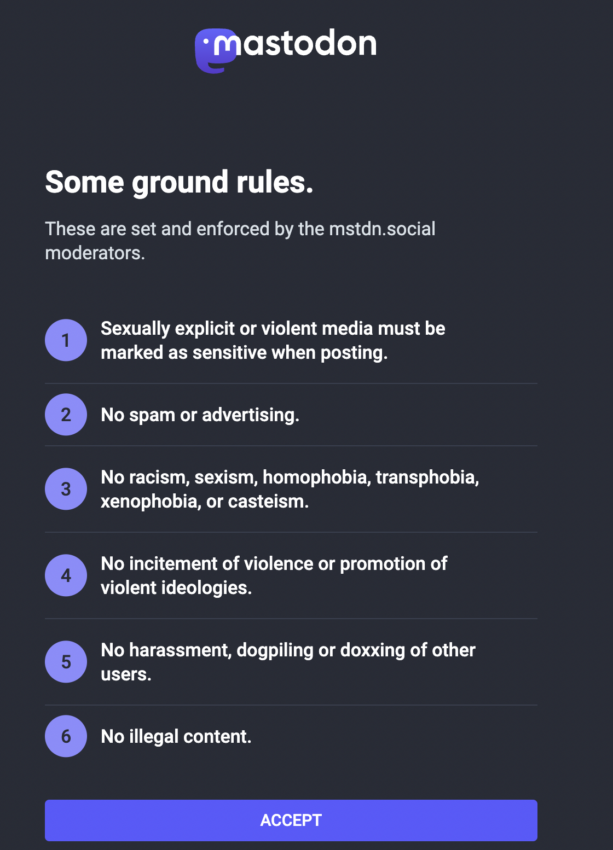
- Accept the conditions and then set up your Mastadon account. Once done, head over to the email client and hit the confirmation button to start your Mastodon journey.
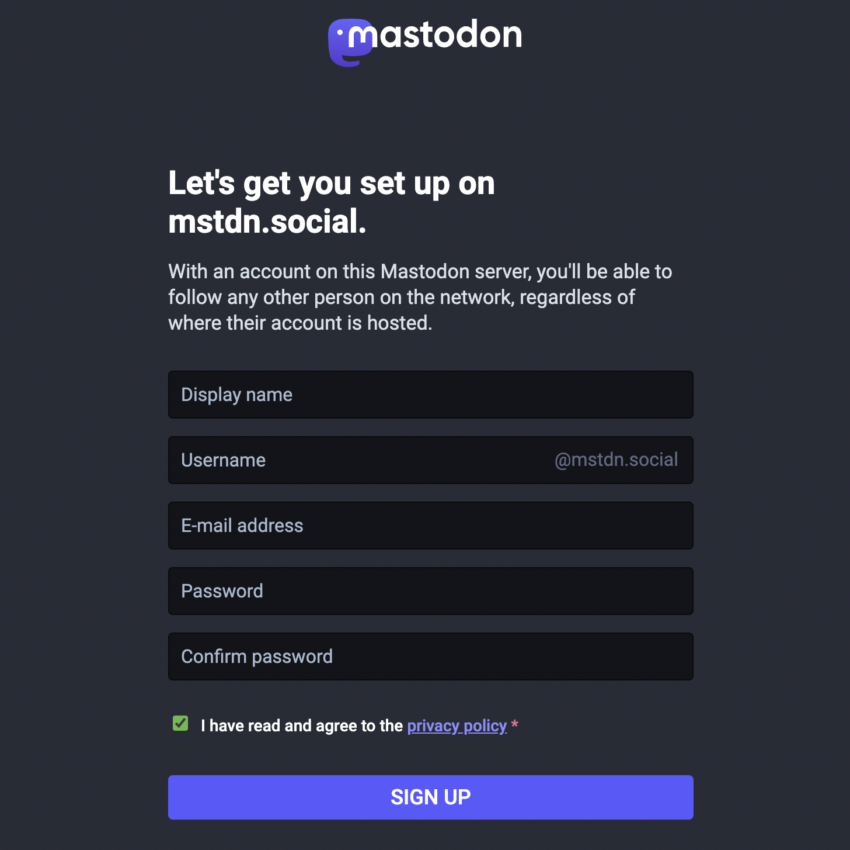
- Clicking on the confirmation link takes you to your Mastodon account. You can then use the right-side interface to open your profile, edit the same with an image, and even follow the users on the mstdn.social server.
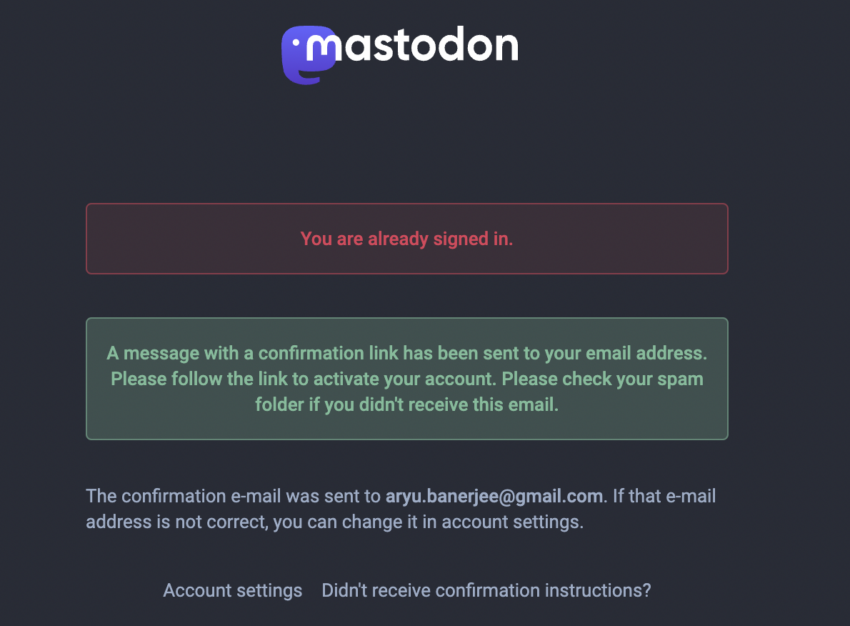
Part 2: playing around
- You can find the users to follow and even check your Home, Local, and Federated timeline using the options on the left side.
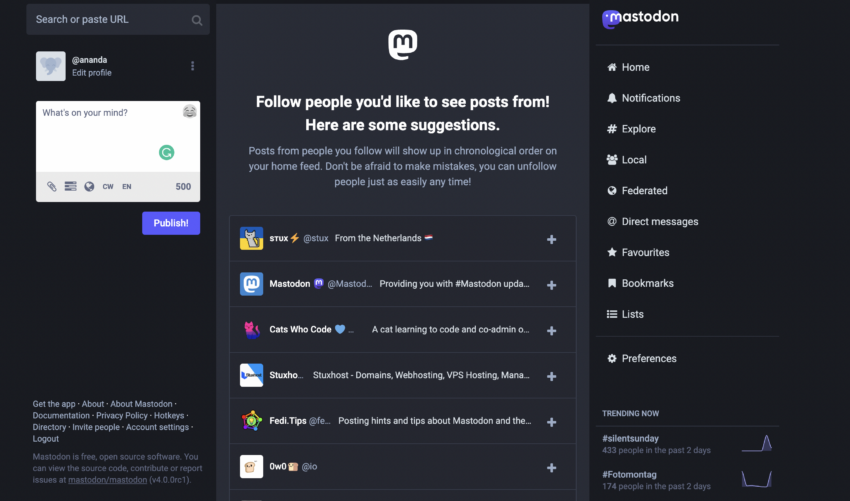
- If you have time, you can click on Edit Profile and play around with the options available to make the account more interactive with other users. You can choose your Avatar and Header and can even check the “Bot” account option if the account is only meant to perform automated actions.
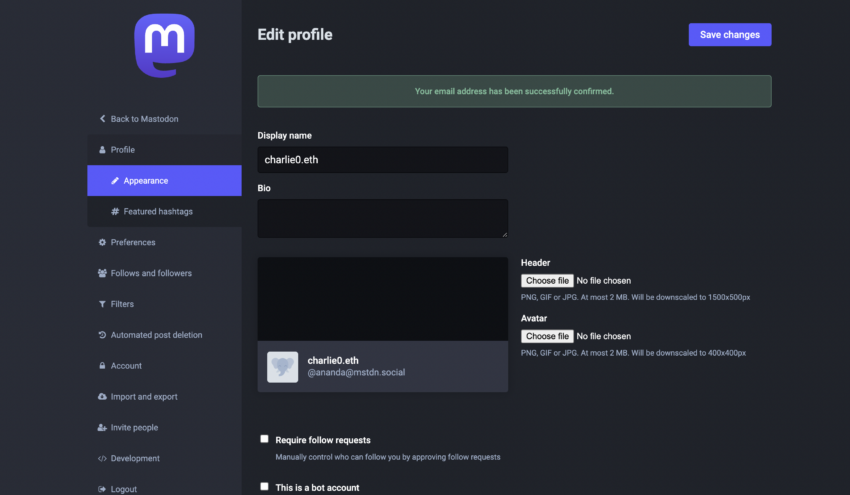
- You can even check on the followers, invite people, delete posts after a certain period, and do several other things with your account.
- We recommend you play around with the options and set up the account as per your preferences. Yet, if you want to continue using Mastodon on the browser, we would recommend clicking on “Preferences” and activating the “Enable advanced web interface.” Once you save the change and go back to the instance panel, you will find Twitter-like tile segregation, with the recent post and notification tile placed side by side.
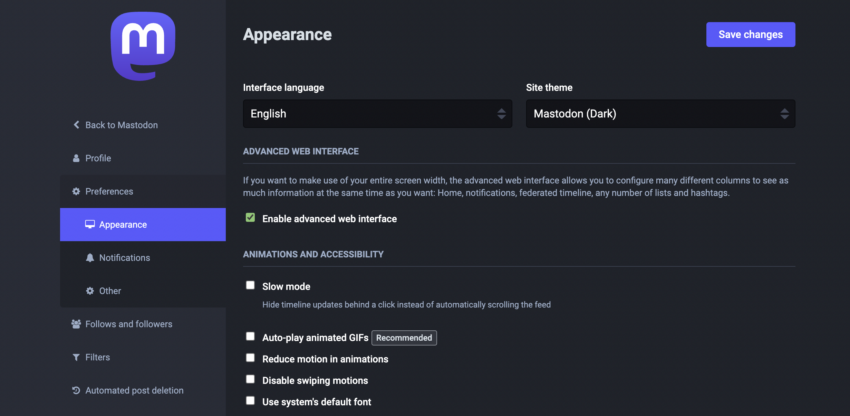
Additional things to note
You can keep playing around to set the home, local, and federated timelines as per your liking. And this side-by-side placement of timelines allows you to pull up any profile that resonates with you, which you can follow. Therefore, Mastdonon gives all the control to your hands.
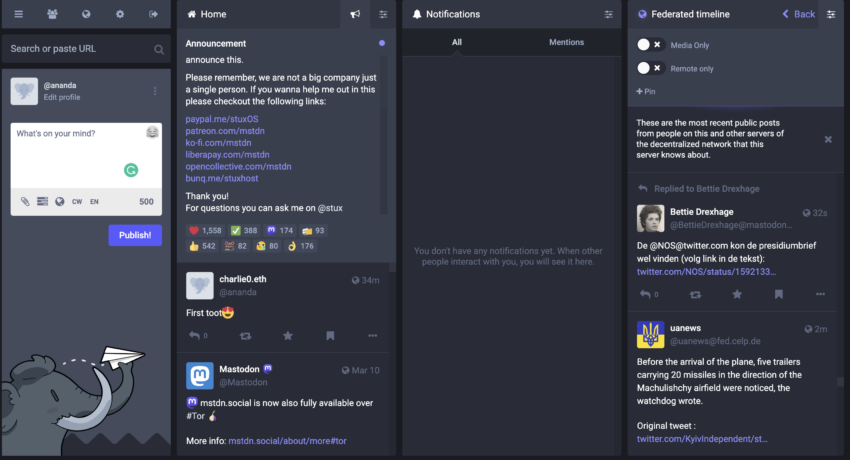
Toots and content show up chronologically. There is no algorithm that lets you view things depending on your past and present search patterns.
Mastodon, a better Twitter alternative?
Mastodon is a Twitter alternative. A better alternative or not depends on how you want your social media experience to be. In case you prefer autonomy and the absence of a central authority while using social media, Mastodon is the option to go. However, if you prefer simplicity and user experience, Twitter might just score higher.
Anne Bailey from KuppingerCole feels that Mastodon is still a bit too technical for a standard user. And this might even pose adoption challenges. On the flip side, Mastodon — almost immediately offers better control over the content you prefer seeing. Plus, the way servers/instances show up, a strong community-specific flavor is always there with this social media network.
Therefore, with a few trade-offs, Mastodon is worth experiencing. However, for now, we would recommend using it alongside Twitter to get a better feel of the difference.
Not willing to see the differences on your own. Read further to know how these social media platforms compete against each other, feature by feature.
Mastodon vs. Twitter: everything important

Centralization
Twitter is a centralized platform, period. If you violate the standard norms or someone in control of the social network doesn’t like you, you might face a ban.
However, Mastodon is all about decentralization, as every independent community has administrators with a specific set of regulations in place. Even if you do not find a place in one server, you can always reach out to any other community.
Clarity
This is the difference that is slightly aligned in favor of Twitter. The moment you join Twitter, you get to experience everything at once. You can even choose the topics to narrow down your sightings. With Mastodon, there are so many servers to choose from, making it hard or rather confusing to stick with one. Also, certain servers or instances have guardrails, and you might have to send a request to join.
User base
Twitter takes the cake here with over 238 million active users. Mastodon, on the other hand, has a long way to go, with 1 million active users in play. Therefore, if the deciding factor concerns the size of the platform, people will continue to stick with Twitter.
The parlance
While Twitter lets you tweet, retweet, and like content, Mastodon offers the same set of features but under different parlance. The options used here include toots/twoots, boost, and favorite. And each server is called an instance — something that Twitter doesn’t indulge with. Each instance has its own set of rules. Unlike Twitter, Mastodon doesn’t follow the one-size-fits-all approach with its rules.
Revenue model
We already know that Mastodon is a non-profit organization, with Patreon funding as the primary source of income. Twitter relies heavily on ads, which means that for Twitter to generate revenue, every Twitter user should stick around long enough.
Open-source
Mastodon is a product built atop the ActivityPub protocol, which aims at connecting other apps in the Fediverse — a federated and interoperable network. The code is usable, unlike that of Twitter.
Character limit
Mastodon allows users to send toots with an upper limit of 500 characters. Twitter, however, truncates the same to 280.
Speed
Finally, Mastodon can get a bit sluggish at times, as it doesn’t have the required central server strength like Twitter.
But this tweet was unexpected!
Pressed for time! Here is a table to let you quickly look through the differences between Mastodon and its Twitter alternative.
| Parameters | Mastodon | |
| Centralization | Yes | No |
| Clarity | Easy to navigate | Hard from a technical angle |
| User-base | Over 238 million | 1 million |
| The Parlance | Tweets, Retweets, and Likes | Toots, Boosts, and Favorites |
| Revenue model | Advertisements | Patreon funding |
| Open source | No | Yes |
| Character limit | 280 | 500 |
| Speed | Very fast | Slows down often |
Are there any similarities?
Yes, there are a few similarities between Mastodon and Twitter:
- A similar visual layout when you select the “Enable advanced web interface” on Mastodon.
- The features are similar, just the names are different.
- You can include images, videos, and even text in each toot, similar to what Twitter allows.
Why are people leaving Twitter for Mastodon?
Since Elon Musk took control of Twitter, the following things and announcements surfaced:
- The elusive “blue tick,” which only celebrities and notable personalities could get, is now up for sale for $8. The initial idea was to charge $20.
- Several top-level executives were shown the door.
- Elon Musk stood his stance to monetize the blue tick — which makes Twitter’s decision-making approach way too centralized.
- Starting 4 Nov. 2022, 37,000 employees were shown the door.
- On 10 Nov., he mentioned that bankruptcy might not be out of the question as advertiser revenue has started to dry out post his takeover.
- Twitter might go belly up if the FTC (Federal Trade Commission) imposes fines due to concerns over Twitter’s practices involving data security.
- Impersonators made use of Twitter Blue, causing Eli Lily — a pharmaceutical company — much harm. A post saying that “We are excited to announce that insulin is free now,” surfaced, causing a 4.5% dip in the organization’s stock.

The paid blue tick distribution is currently on hold.
And all of the mentioned reasons have ensured that social media purists are steadily leaving Twitter to join the Mastodon social media. Almost 90,000 Twitter accounts went off between 27 Oct. and 1 Nov., according to Twitter account tracker — Bot Sentinel.
Decentralization is a “Mast” have
Twitter’s new ownership, followed by the abrupt product changes, has helped Mastodon. People’s dwindling faith in Elon Musk seems to be a reason. However, for now, Twitter’s centralized approach defeats the purpose of a decentralized social media where multiple people decide. With decentralization being a must, we wouldn’t be surprised if we see Mastodon, the Twitter alternative, gaining some more attention in the future.
It is too early to say that Mastodon will emerge victorious in the Mastodon vs. Twitter showdown. Elon Musk has quite a few plans in the pipeline, and once they fall into place, we will reevaluate the situation and shed some more light on Mastadon, the Twitter alternative of choice.
Frequently asked questions
What is the most popular alternative to Twitter?
What is Mastodon and why are people leaving Twitter for it?
Is there a replacement for Twitter?
What’s so great about Mastodon?
How does Mastodon make money?
Is Mastodon decentralized?
What company owns Mastodon?
Is Mastodon social Safe?
Trusted
Disclaimer
In line with the Trust Project guidelines, the educational content on this website is offered in good faith and for general information purposes only. BeInCrypto prioritizes providing high-quality information, taking the time to research and create informative content for readers. While partners may reward the company with commissions for placements in articles, these commissions do not influence the unbiased, honest, and helpful content creation process. Any action taken by the reader based on this information is strictly at their own risk. Please note that our Terms and Conditions, Privacy Policy, and Disclaimers have been updated.


